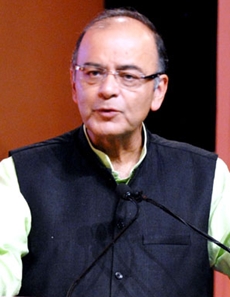Jaitley promises softer, predictable tax regime
17 Apr 2015
India is well on its way to becoming a modern tax system offering globally competitive rates, finance minister Arun Jaitley told foreign investors and assured them of a predictable and friendly tax regime that sees taxpayers as partners and not as hostages.
 Speaking at the Peterson Institute for International Economics in Washington DC on Thursday, the finance minister said the policy of low tax rates and a non-coercive tax regime applied to domestic taxpayers also.
Speaking at the Peterson Institute for International Economics in Washington DC on Thursday, the finance minister said the policy of low tax rates and a non-coercive tax regime applied to domestic taxpayers also.
But, he said, while the rates need to be low as taxes are seen as money being forcibly transferred from citizens to the state, the tax net should be wide enough so that everyone feels being part of the government.
Jaitley said he is ''actually aware'' of investor concerns about retrospective taxation and arbitrariness in tax administration, especially those relating to cases of transfer pricing, and assured foreign investors against any retrospective action.
He said taxpayers will be seen as ''partners and not as potential hostages or victims''.
Jaitley said: ''These are not expressions of intent and we have translated them into action.''
He also said his government had taken several steps to reduce litigation and the tax authorities have been instructed not to ''file frivolous appeals in a routine manner.''
The finance minister cited the instances of Vodafone and Shell where the government decided not to contest high court orders that went in favour of the companies.
''Let me emphasise that we are absolutely committed to a transparent and predictable tax regime. There will be no retrospective actions and we will see taxpayers as partners not as potential hostages or victims,'' Jaitley said in his address.
Jaitley said: ''Tax policy and administration should incentivise compliance. They should be administered fairly, transparently, with minimum discretion, with no harassment of taxpayers but also ensuring that tax evasion is dealt with firmly…We will aim to keep the rate competitive and close to international levels and minimise exemptions.
But, he said, ''The tax net should be wide so that all citizens feel they are part of government, but rates should be low, because taxes after all are seen as forcible transfer of money from citizens to the state,'' adding that India needs to have a modern 21st century system for indirect taxes, direct taxes and tax administration.
''Such a modern tax system, which is friendly to the people and businesses, would be a key to realising the goal of a double-digit growth,'' he said.
Expects to launch GST soon
The finance minister, who is in Washington to participate the IMF-World Bank meeting, said he was confident that the Parliament would pass the necessary constitutional amendment bill for the goods and services tax (GST) in the next three weeks.
''GST is a modern tax, a consumption-based value-added tax, and a tax that avoids tax cascading,'' he said, adding that this would create a broad tax base and will strengthen revenues going forward and increase the tax-GDP ratio.
''It will not only promote transparency and reduce corruption because of the paper trail it will create; but would also go towards creating a common Indian market because it will replace a number of state-levied taxes.
''We aim to secure legislative passage within the next three weeks at the centre after which it will go to the states,'' he said, while adding that the GST council, which has representations from all states and the centre, will decide on a revenue-neutral rate.
''We will aim to keep the rate competitive and close to international levels and minimise exemptions,'' he said. The government aims to implement the GST by April 1, 2016.
Jaitley said the direct tax system also needs to catch up with the modern GST system, adding that the budget had announced important corporate tax reform to reduce rates, and broaden the base by eliminating exemptions.
''We are acutely conscious that capital chases destinations with the cleanest tax systems and competitive tax rates. The ASEAN average corporate tax rate is about 21-22 per cent.
Accordingly, the corporate tax rate will come down from 30 to 25 within 4 years, beginning 2016,'' he said, while adding sufficient time is being given to taxpayers to adjust to the new environment.


















